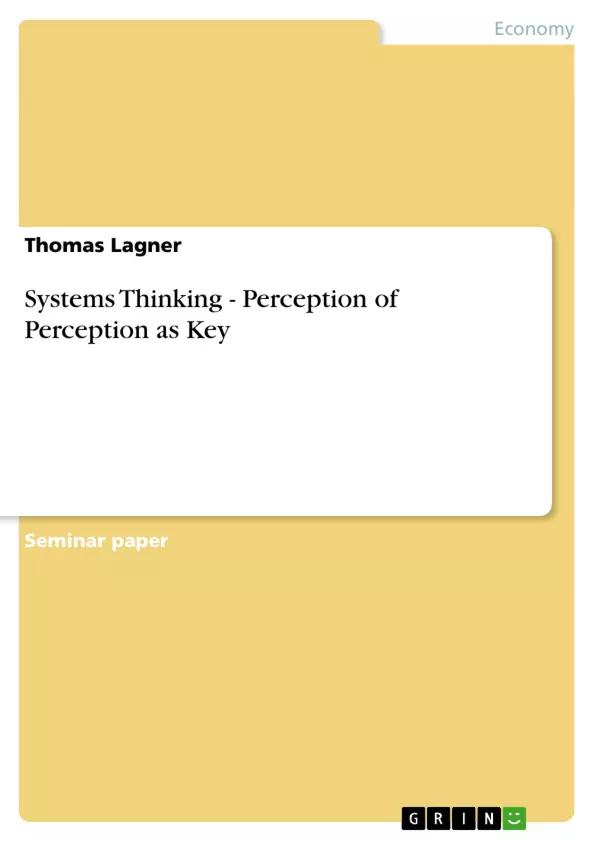When I started to capture the readings for this paper I came across the above mentioned quote and realized the close connection between the way we perceive reality and how perception is the key to systems thinking at the same time.
Systems’ thinking in particular means to stop assessing reality in fragments and details but instead looking at wholes. A true systems thinker therefore observes dynamic interrelationships and patterns rather than mere “snapshots”. As it will turn out by looking at the example of Chris
Bangle, chief-designer at BMW, system thinking can especially considered to be an art. The goal of this paper is moreover to show how “our actions create our reality” (Senge 1994, 1) and how we can be the craftsmen. I will moreover briefly apply the “Appreciation Influence Control”-Model (AIC) by Bill
Smith and Elisabeth Davis to underline the important role perception plays in systems thinking. This model centers on how to achieve and realize the full potential of a purpose (goal). The overall philosophy is to come to understand the “power” which is involved in the organizing process. In detail, the process itself consists of three levels that have to be properly ‘managed’ in order to succeed in realizing the purpose aiming at: (1) Appreciation – Relating to the overall system that is relevant (information).
(2) Influence – Relation to the components of the system (transformation).
(3) Control – Directing resources to attain the purpose (formation).
I have therefore separated this paper into three parts according to the AIC-model. In the first part I will focus on the importance of perception and how perception impacts “appreciation”. In the second part I will consider how as consequence of a different perception of reality the organizing process has been transformed to systems thinking – the “influence” of changed
perception. In the final and third part, I will then show how systems thinking can take place in daily practice and how it can be acquired.
Inhaltsverzeichnis (Table of Contents)
- (1) Introduction
- (2) Information: Perception and Uncertainty
- (3) Transformation: The Journey to Systems Thinking
Zielsetzung und Themenschwerpunkte (Objectives and Key Themes)
This paper explores the importance of perception as a key element in systems thinking, highlighting how our perception of reality shapes our actions and creates the reality we experience. The paper draws upon the work of various authors, including Senge, Hofstede, and Weber, to demonstrate how understanding and managing perception is crucial for effective systems thinking.
- The relationship between perception and systems thinking
- The impact of uncertainty and cultural patterns on perception
- The importance of appreciating uncertainty in systems thinking
- The transformation from linear thinking to systems thinking
- The influence of perception on organizational structures and processes
Zusammenfassung der Kapitel (Chapter Summaries)
- (1) Introduction: This chapter introduces the central thesis of the paper, emphasizing the significance of perception in systems thinking. It also presents the "Appreciation Influence Control" (AIC) model as a framework for understanding the process of systems thinking.
- (2) Information: Perception and Uncertainty: This chapter delves into the concept of perception and its role in shaping our understanding of reality. The author discusses the influence of cultural patterns and the terror-management-theory on our perception of uncertainty, highlighting the need to appreciate and manage uncertainty for effective systems thinking.
- (3) Transformation: The Journey to Systems Thinking: This chapter traces the historical transformation from linear thinking to systems thinking, showcasing how scientific and managerial advancements have led to a greater awareness of perception's impact on organizational structures and processes.
Schlüsselwörter (Keywords)
The paper explores key themes and concepts including perception, systems thinking, uncertainty, cultural patterns, organizational structures, the AIC-model, and the transformation from linear thinking to systems thinking. The discussion focuses on the role of perception in shaping our understanding of reality and its impact on our ability to effectively engage in systems thinking.
- Quote paper
- Thomas Lagner (Author), 2005, Systems Thinking - Perception of Perception as Key, Munich, GRIN Verlag, https://www.grin.com/document/62146



